The future of Kansas education starts with pizza boxes and a one-room schoolhouse
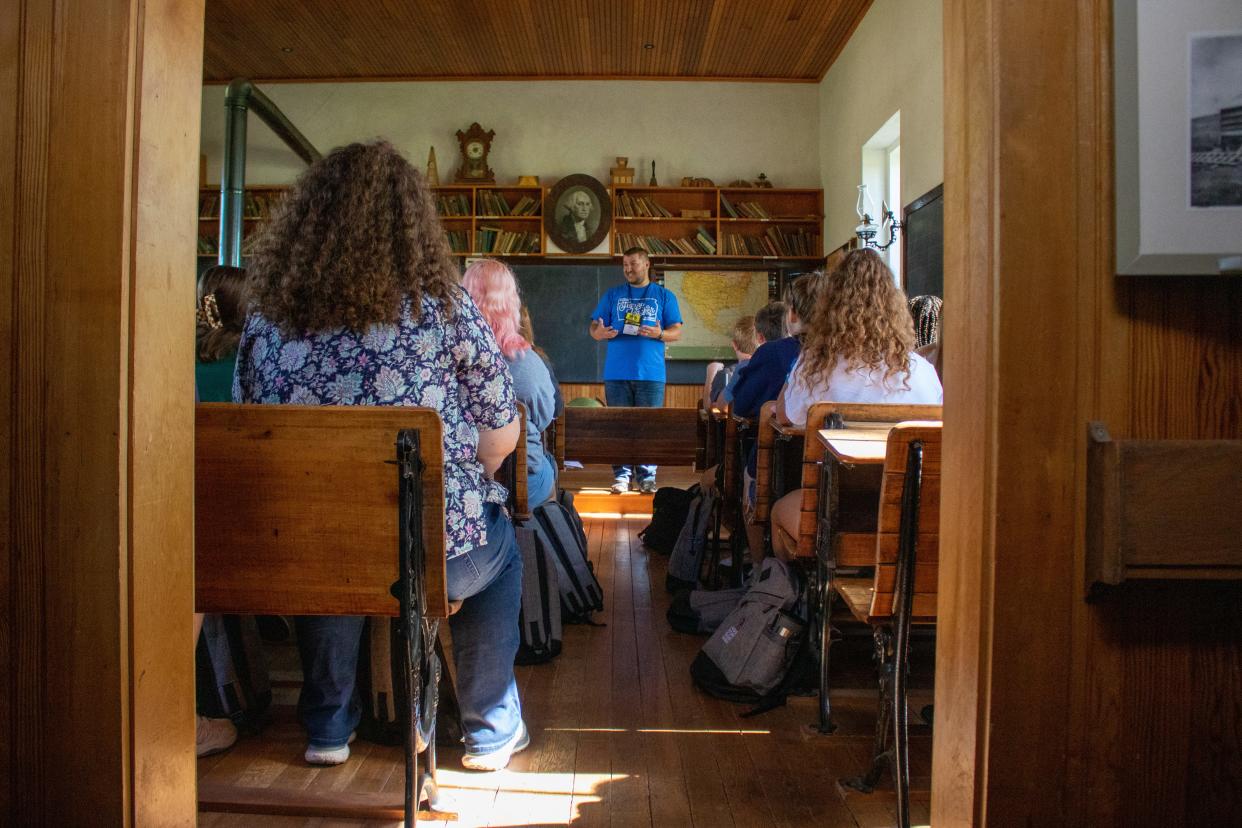
EMPORIA — Wooden floors, benches and desks creaked as the 30 high school students clambered single-file into the past of Kansas education.
This was the one-room schoolhouse, just steps away from The Teachers College at Emporia State University. In Kansas' early days, thousands of these limestone block, bell-topped schools dotted the state's prairies, and antique books and classroom materials adorning the walls in this relic stood as tribute to the state's education pioneers.
At the front of the schoolhouse, Todd Roberts walked the students through those chapters of education history, when most schooling stopped after eighth grade.
Teaching was a communal task, with older students (and sometimes siblings) helping younger students learn their reading, 'riting and 'rithmetic. Social norms dictated how teachers — most of whom were women — behaved even outside the classroom, with contract stipulations against going out to the town ice cream parlor more than once or twice a week.
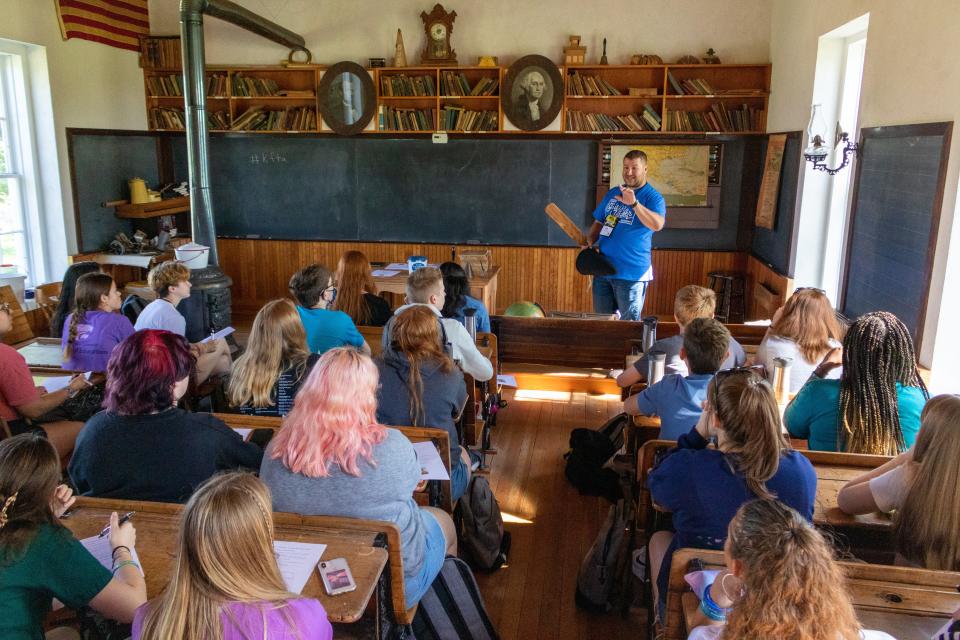
The most astonishing thing to the students?
It was only a couple of generations ago.
"This week, we are going to reimagine education," Roberts told the students, "and to do that, we need to go back to the very basics of where education started. And I know it might seem like a really long time, but in the big picture, 60, 70 or 80 years ago isn't all that long ago."
Sixty high school students from all across the state this week converged on Emporia State's campus for the annual Kansas Future Teacher Academy, a weeklong summer camp hosted by the college. The camp, aimed at students still thinking about a prospective career in education, aims to expose them more deeply to what it takes and means to be a teacher.
"If we can start getting them now and help them change their lens and perspective on education, we want to do it now instead of waiting another three or four years for them to get to college," said Roberts, camp director.
But if they'll join the profession, the students know they have their work cut out for them. Their high school years have been in the context of COVID, and deficiencies in the always-done-it-that-way approach to education were only magnified for them in learning during the pandemic.
Their goal as future educators, then, will be to redefine education.
Commissioner: Redesigned education will be for Kansas' struggling students
About 40 minutes west of Hutchinson, there's a town called Stafford and a boy named Ashton Harter.
Harter, one of 11 seniors next year at Stafford High, has never had the best experiences with school. His grades and attendance have both usually been poor, and he admits he's never put much effort into his studies. An attention deficit disorder and anxiety diagnosis make him liable to "space+ out a lot" during class.
But that's precisely why he wants to be a teacher.
"All my teachers, they were the kind of people who had straight As and 4.0s — the kind of people who never struggled much in school," Harter said. "I never really had anyone to relate with in how much I struggled, and I feel like I can be that for someone in the future, so they don’t feel like they’re stupid.”
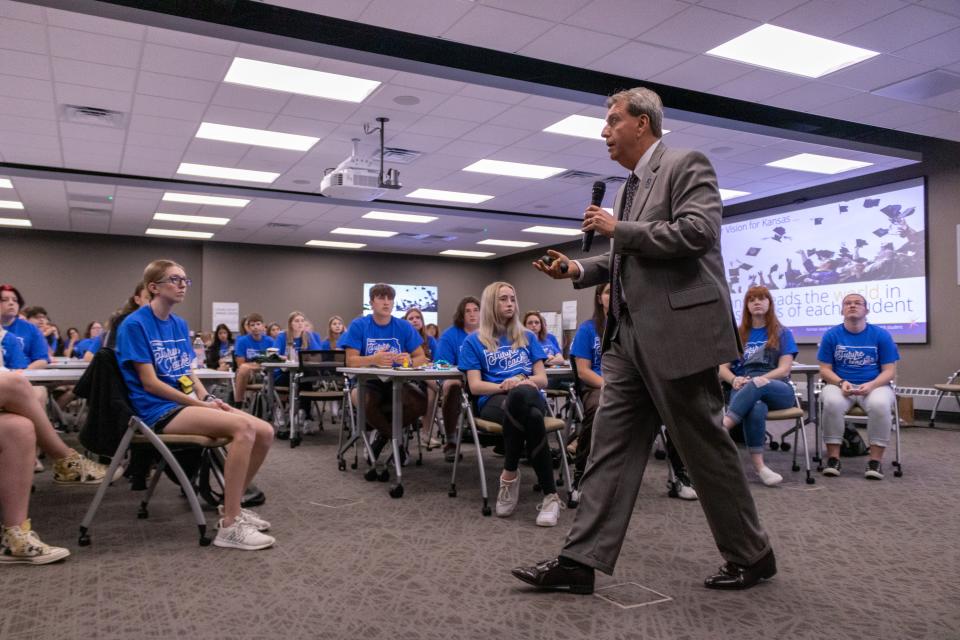
Harter and other students from small towns like Stafford, population 959, and big ones like Wichita alike made up the 60 campers at the Kansas Future Teacher Academy. In remarks to the group, education commissioner Randy Watson told them they collectively represent the future of the state's education system.
Watson shared with the students some of the state's existing efforts to redesign schools, with higher focuses on personalized, project-based learning and social-emotional student support, as part of the state board of education's vision to have Kansas lead the world in the success of each student.
In the face of what he believes will be the largest educator shortage in Kansas history, Watson said students haven't had as much exposure to the rewards of "the greatest profession." Huge challenges, in terms of both rebounding academically from COVID-19 learning loss and financial challenges of dwindling enrollment, await Kansas schools, he said.
But that makes the campers' drive to become teachers that much more critical for the state, Watson said.
"Change is slow sometimes, but I’m optimistic that our future lies not in the kids who have always been successful, but in the kids who haven’t had that success, and in redesigning our education system for them," Watson said.
Pizza box pedagogy
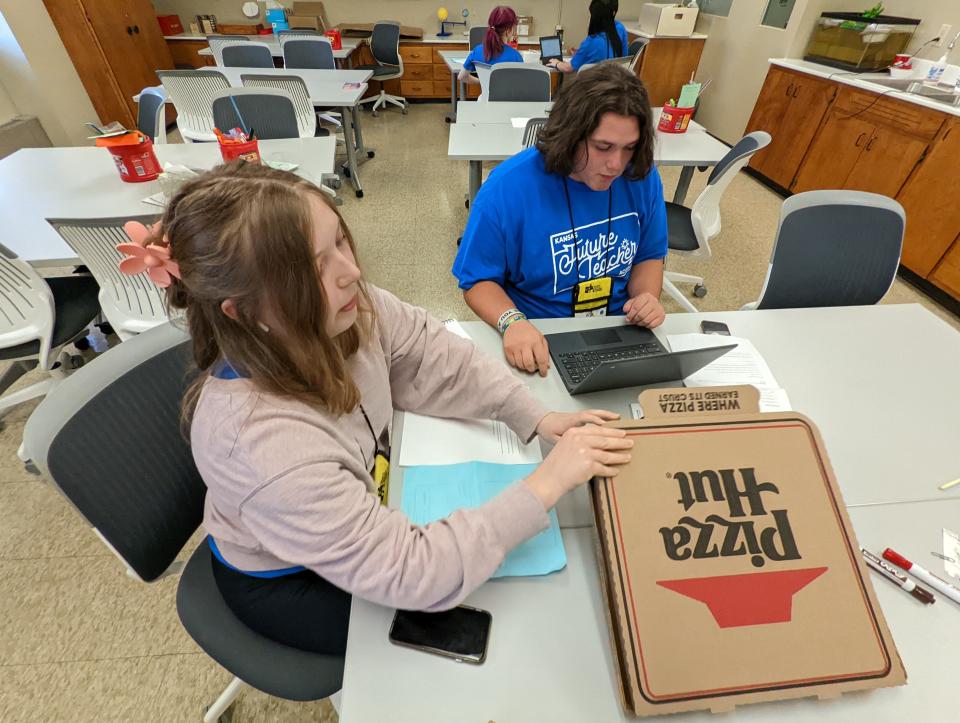
Throughout the week, the campers delved deeper into what it means to be a teacher, participating in projects and sessions led by recent Kansas Teacher of the Year winners.
Amy Hillman, a 2020 Kansas Teacher of the Year, helped lead campers throughout the week. Formerly a classroom teacher at Santa Fe Trail Middle School in Olathe, she now works as a recruiter for that district.
She said educator preparation programs have to start thinking about reaching prospective teachers differently, "because they're not coming to us anymore."
"The kids understand this generation way better than we have ever known," she said. "And that doesn’t mean we (as teachers) have done it wrong. But we know there are broken pieces in public education, and they will only be remedied with an understanding of the next generation."
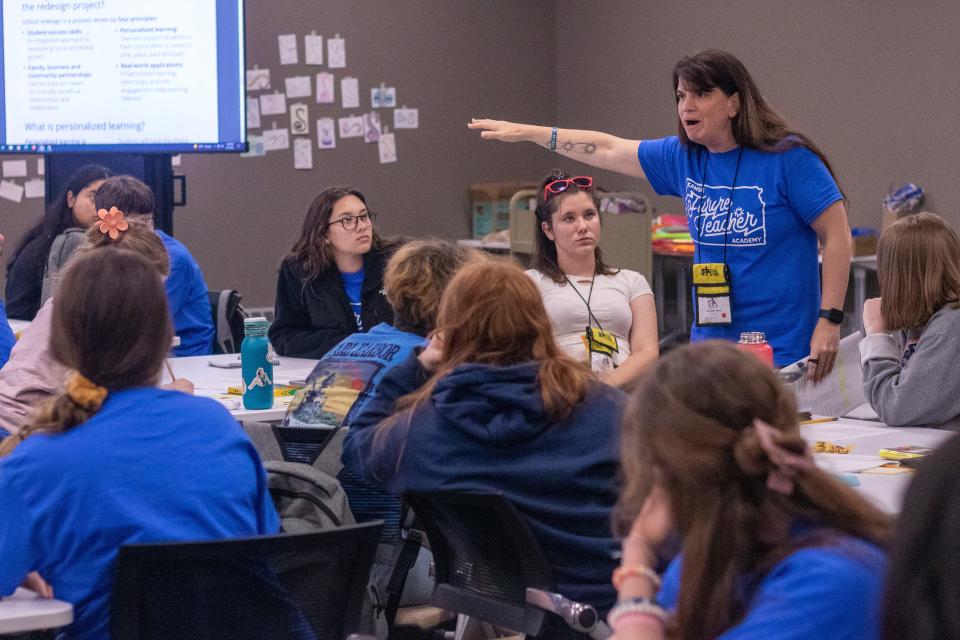
Throughout the week, campers took notes at each of the sessions and activities, which included the teacher-led sessions as well as scavenger hunts and a trip to the county historical museum. In groups of two or three students, they put together a presentation on a theme they learned about throughout the week, using the backs of donated pizza boxes.
Harter, the student from Stafford, worked with Olathe East sophomore Isabella Hermansen on a pizza box centered around the theme of engagement. The duo said that they hope to one day use projects like the pizza box in their own classrooms.
"If students aren't actively engaged, it's a lot harder for them to learn or understand anything they might be taught in school," Hermansen said.
Academy builds connections among prospective teachers
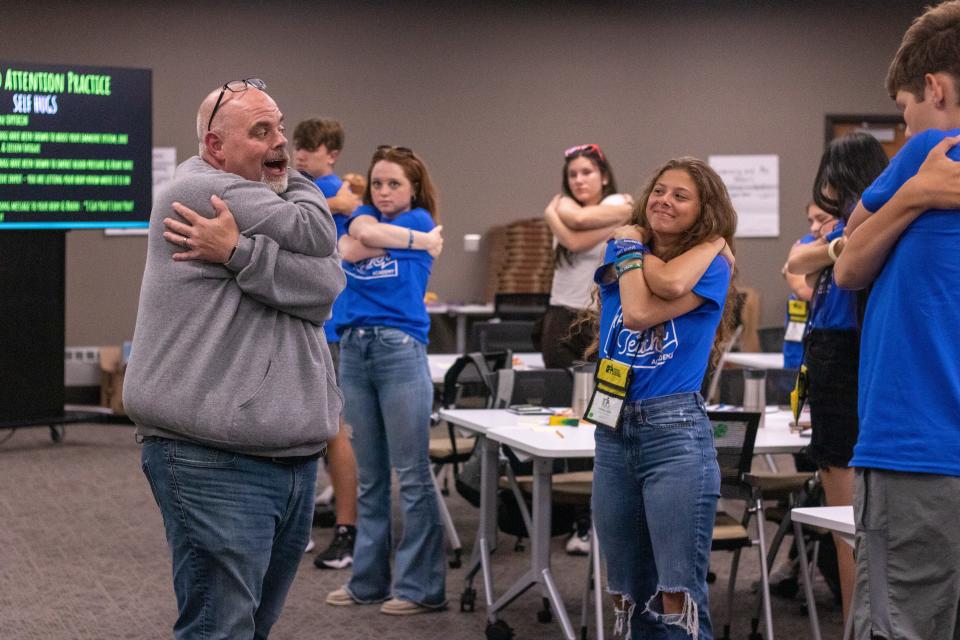
In addition to teaching the campers about the profession, the Kansas Future Teacher Academy also focused on building a support network for the students.
Although it's one of the largest professions in Kansas, education struggles with retention as teachers burn out of the profession, said Roberts, the camp director.
"Not all students here have best support system at their schools," Roberts said. "Some students don’t fit in at home, and here, they’ve found people who understand them and support them. We want them to build this network of friends and support across the state as they begin their careers."
For the campers, it can feel daunting heading into a profession undergoing such drastic change.
But the students said they'll rely on the roots of the profession, as well as the example set for them by teachers who made a difference in their lives, as they take the next step for Kansas education.
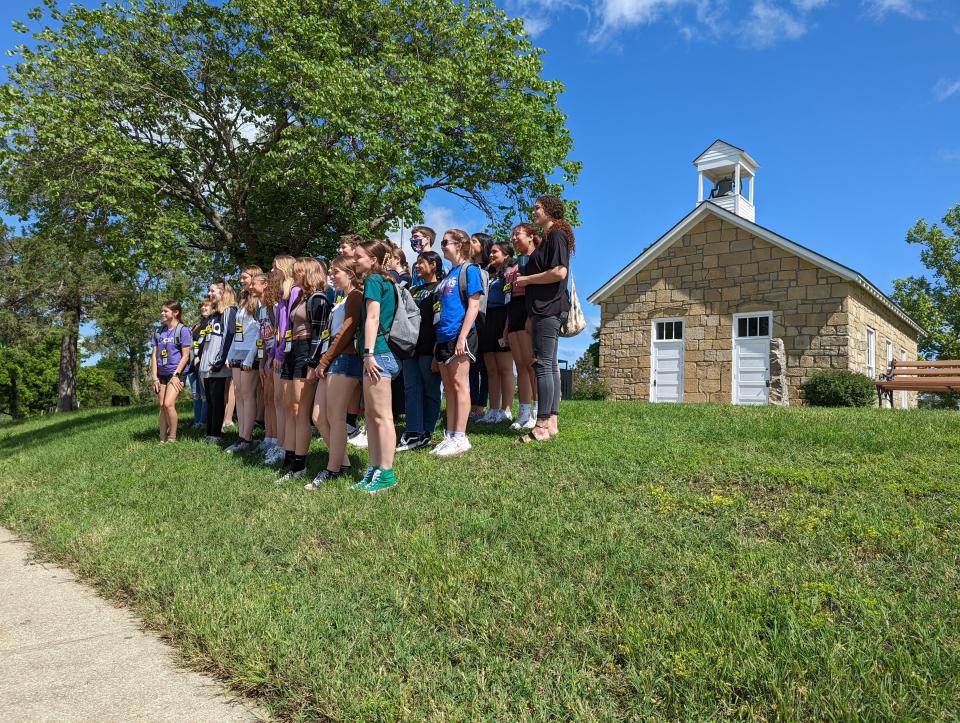
"It’s going to be different, but I think we need to embrace that," said Madeline Byerly, a junior at Manhattan High School. "There might be some resistance and people who say, ‘The old systems works perfect,’ but when it doesn’t, no one likes to talk about that."
"The future for teaching is bright," Harter said. "I’ve met so many brilliant people here, and I’ve talked to a lot of them about how they’ll end up teaching their classroom, and it’s amazing to think about those possibilities."
Rafael Garcia is an education reporter for the Topeka Capital-Journal. He can be reached at rgarcia@cjonline.com. Follow him on Twitter at @byRafaelGarcia.
This article originally appeared on Topeka Capital-Journal: Kansas Future Teacher Academy hosts 60 high schoolers at Emporia State

